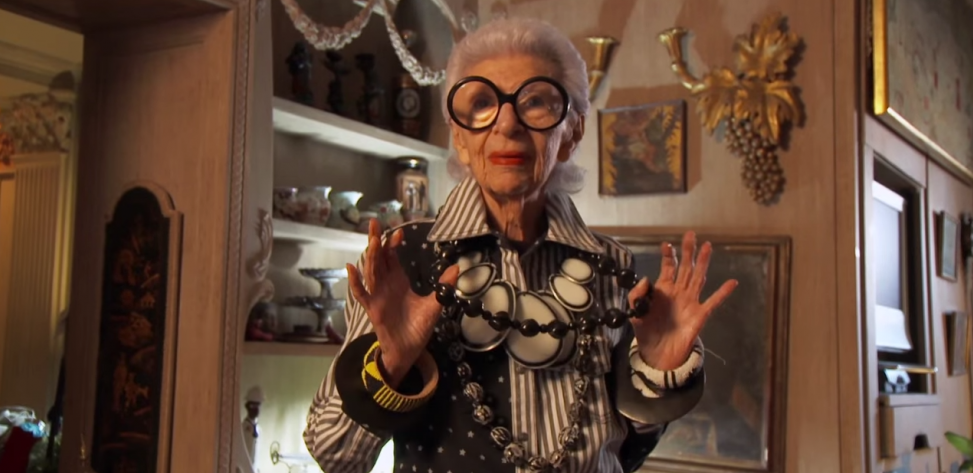
Directed by the great and recently departed documentarian Albert Maysles, Iris is a charming if slightly unambitious portrait of the self-proclaimed ‘geriatric starlet’ and fashion icon Iris Apfel. Though it’s a fairly modest work, content to observe and let its subject speak, the film scrapes by on the charms of its leading lady and a few fleeting philosophical detours into Apfel’s reflections on ageing and the fate of fashion in the modern world.
Iris Apfel’s career has spanned almost seven decades, spanning interior decoration, fashion collection and design, and even a brief stint as visiting professor lecturing in fashion at the University of Austin. Apfel first came to prominence in the world of interior decorating with the formation of the Old World Weavers together with her husband Carl in the 1950s, which was responsible for, amongst other things, the interior design in the White House for nine different presidents. A move later into fashion pushed her into the public eye, most notably a curated collection of her eccentric clothes and accessories in a very popular show at the Metropolitan Museum of Art in 2005. Named the “Rare Bird of Fashion”, the exhibition drew from Apfel’s enormous, idiosyncratic collection of fashion accumulated over several decades, typified by bold colours and outlandish amounts of accessories.
Maysles film sketches the contours of this career over time, but mostly focuses on Apfel in the present day, her reflections on life and her general goings about town both in New York and Palm Beach. While occasionally breaking the interview and one-on-one format to switch to talking heads or footage from fashion shows, much of Maysles’ time is spent in intimate proximity with Iris in her home with her husband. While in the director’s classic direct cinema documentaries from the 1960s and 70s, such as Salesman and Grey Gardens, the director’s approach was typified by a reserved and fluid “fly-on-the-wall” observation of his subjects in their element, here Maysles’ presence as filmmaker is felt more strongly. Maysles not only briefly appears in front of the camera in a couple of brief sequences, he is also addressed directly by Iris when he has his camera trained on her, giving us the feeling that this is above all a film made between two friends.
A film like Iris, based as it is so heavily on a strict focus on its subject in intimate settings, has to get by to a great extent on that subject’s personality and charisma, and thankfully Apfel has both in spades. Even at age 93, Apfel displays an undeniable charm and wit as a speaker, and her bon mots on a range of topics are peppered throughout the film: plastic surgery (“Some people come out looking like a Picasso”), parties (“Getting dressed for the party is more fun than going there”) and happiness (“It’s better to be happy than well-dressed”) all get the Apfel treatment and these nuggets of wisdom drew the biggest laughs from the festival crowd in attendance.1 Occasionally, the question of mortality rears its head, especially as her husband Carl Apfel, who turns 100 during filming, experiences health problems. Here, Iris speaks quite movingly about age and ageing, and about what really matters at the closing stages of one’s life, doing so in a way that is both lightly self-deprecating and down to earth.
Being the total fashion luddite that I am, the most interesting parts of the documentary were for me the moments in which Apfel spoke about her philosophy of fashion style and collection. We see her in action at thrift shops, buying up $4 bracelets and haggling with shopkeepers on various bric-a-brac, and this is more than just obsessive hoarding. For Apfel, this collection of secondhand pieces is something of a political stance, a reaction to what she perceives as the stamping out originality in the fashion world. In an age of endless mechanical production and reproduction, made for the appeasement of seemingly meaningless and arbitrary fashion trends generated by elite tastemakers, Apfel’s improvised, thrown together (though not strictly cheap) outfits are an attempt to step outside what she sees as the encroaching sameness spreading throughout the world of fashion.
Though it probably won’t be spoken about in the same breath as the major films directed together with his brother David in the Direct Cinema heyday, Iris is a tempered, intimate piece of portraiture and a fine end to an important body of documentary filmmaking.
